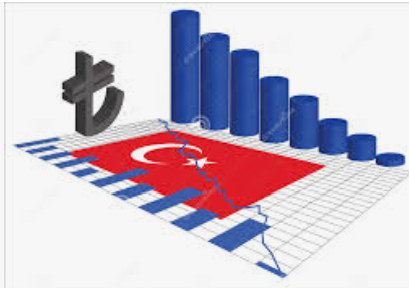While municipal election results showed a better performance by the opposition than pre-election polls had envisaged, the focus now shifts to the economy. President Erdogan has signalled policy continuity. On the macro side, key indicators suggest the outlook has turned slightly less favourable since January..
Key Observations
The Central Bank of Turkey responded to inflationary pressures with a strong and unexpected rate hike in March, a large set of macro-prudential measures and liquidity tightening. These moves will likely further ease concerns about the Bank’s priority to bring down inflation, contribute to supporting both local and foreign investors’ confidence in TRY assets and help anchor inflation expectations.
The Bank seems confident that the tight monetary stance will lead to i) a decline in the underlying trend of monthly inflation by moderating domestic demand, ii) real appreciation in the Turkish lira, and iii) improved inflation expectations. Accordingly, the Bank expects that “disinflation will be established in the second half of 2024”. A disinflation path in line with the CBT projections will increase the chances of a rate-cutting cycle towards end-2024. We now expect 250bp in cuts towards year-end.
The CBT’s macro prudential moves are expected to lead to a sharp slowdown in credit growth. This could also create problems for the real economy. Given this backdrop, once it achieves market stability and control over inflation expectations, the CBT will also decide the timing to unwind credit restrictions, likely by synchronising with rate cuts.
Inflation was lower than the consensus in March but despite some improvement in the underlying trend, the data showed continuing pricing pressures in non-food groups and confirmed challenges to the disinflation process.
GDP growth in the first quarter will likely remain robust on the back of base effects from last year, continuing support from the fiscal side and still solid private consumption. However, given the extent of monetary policy tightness currently, the slowdown in the economy will become more pronounced after the local elections and 2024 growth could turn out to be below the 3% level, in our view.
The downward trend in the current account deficit, which started after hitting a peak in July last year, has continued. According to the provisional customs data released by the Ministry of Trade, the foreign trade deficit dropped by more than 40% to US$7.0bn in February. The data implies a continuation of the recovery in February’s current account. Additionally, the positive impact of recent CBT actions on the balancing of demand factors is likely to be observed with a lag and support the trend in the current account.
FX and rates outlook
Between the February and March MPCs, the lira fell close to 5%, likely reflecting onshore demand for hard currency driven by expectations of post-election exchange rate volatility, a high seasonal current account deficit in the absence of large tourism revenues and weaker foreign inflows compared to 4Q23. Accordingly, net foreign exchange reserves, which increased rapidly in November and December, have seen a downward trend since the beginning of this year.
Given this backdrop, the CBT bank has responded with a number of tightening actions including another 500bp hike and widening the rates corridor now +/-3% around the policy rate at 50%. The bank has maintained its hawkish stance with a determination to keep rates high and monetary conditions tight.
Following the MPC meeting and in the aftermath of local elections, pressure on the exchange rate subsided while local bond yields moved downwards, though the rising inflation path in the near term is still a concern adversely impacting real returns.
Sovereign credit: Renewed confidence in policy shift
Turkey’s surprise rate hike ahead of local elections should shore up investor confidence that policymakers will stick to their orthodox shift until there are clearer signs of disinflation later in the year. At the same time, with a perceived risk event out of the way due to the smooth passage of local elections, investors will be looking for more concrete signs of improvement in underlying fundamentals, including a further adjustment in the current account and a rebuilding of FX reserves. In this context, spread levels for Turkish sovereign credit look fair, having compressed towards the BB-rated sovereign average, while slightly lagging the rally seen in many higher-beta single-B sovereigns year-to-date.
We would keep an eye out for further new supply as a potential negative catalyst, while the next scheduled rating review by S&P on 3 May could see some further positive momentum (currently B with a positive outlook).
Follow our English language YouTube videos @ REAL TURKEY: https://www.youtube.com/channel/UCKpFJB4GFiNkhmpVZQ_d9Rg
And content at Twitter: @AtillaEng
Facebook: Real Turkey Channel: https://www.facebook.com/realturkeychannel/
